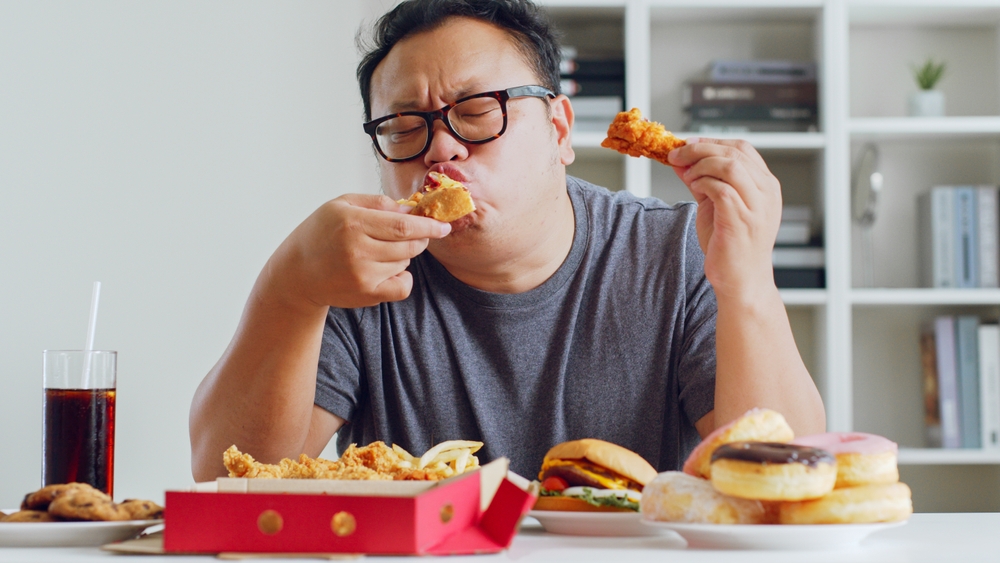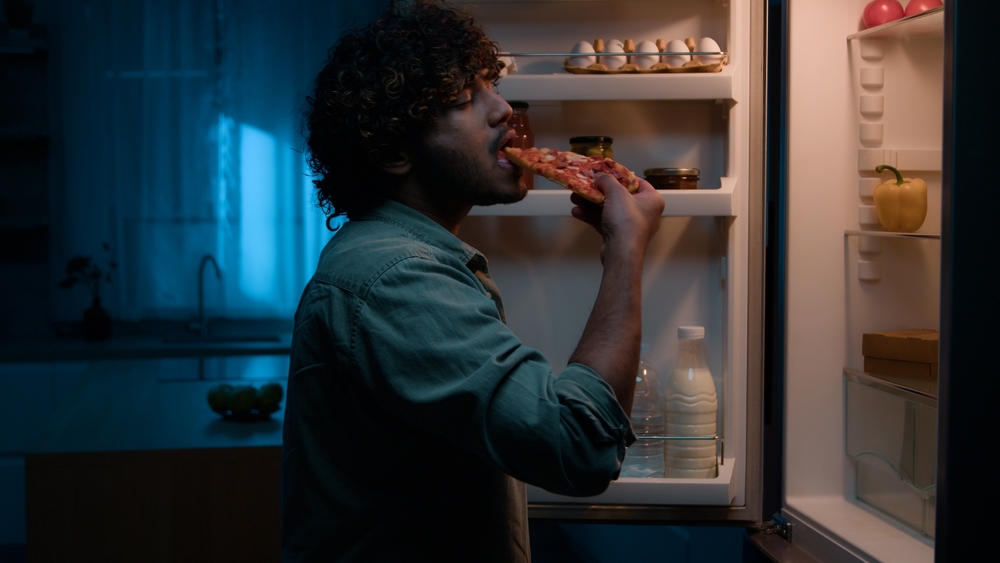Last Updated:
June 10th, 2025
There are commonalities in the way addictive behaviours are formed towards both eating and taking a substance. Either stimulus can serve to soothe us in difficult times and provide a sense of escape when we need it.
However, one significant difference is that we will never have the choice to permanently say no to food. We cannot turn our backs on the sustenance needed for basic survival, which can make compulsive behaviours around food especially dangerous.

What is “compulsive overeating”?
Compulsive overeating is an eating disorder characterised by continuous or frequent excessive eating over which a person does not feel they have control. A person who compulsively overeats will often eat food past the point of fullness, feeling unable to stop as they do so.
For some with this condition, eating won’t be connected to their sense of hunger, instead being driven by emotional distress and psychological factors. Foods are often eaten in secret and are usually tied to feelings of shame afterwards.
Many of us have moments where we eat for comfort or indulge in larger portions. We’ve seen it depicted in movies countless times when a person goes through a breakup or a hard time and decides to “treat themselves” or find emotional comfort in their favourite, relatively unhealthy foods. Yet, emotional overeating goes a little deeper than this, as it’s more persistent and rooted in the psychological drivers. It becomes a coping mechanism for stress, anxiety, low self-esteem, or unresolved trauma.
Compulsive overeating can worsen not just a person’s physical body but their emotional well-being, relationships and daily life. Recognising it as a genuine behavioural issue and not just a lack of willpower is the first step towards healing and recovery.
What are the signs and symptoms of compulsive overeating?
It is not always easy to recognise the signs of compulsive overeating, as eating is a basic survival activity, and one person’s medium portion can represent an overwhelming amount for someone else.
Yet recognising some signs of compulsive eating can help you contextualise whether you or someone you care about may benefit from a stronger, healthier relationship with food. Some of these signs can include:
- Eating large amounts of food in a short period, usually a one or two-hour time window, especially when not hungry
- Feeling as though control is lost during eating episodes
- Eating in secret due to feelings of embarrassment or shame
- Using food to cope with stress, sadness, boredom, or anxiety
- Experiencing guilt or self-loathing, or disgust after eating
- Frequent or rapid weight fluctuations unrelated to diet patterns
- Avoiding social situations due to anxiety about eating behaviours
Is compulsive overeating the same as binge eating disorder?
Though the two terms are sometimes used interchangeably, compulsive overeating and binge eating disorder (BED) are not exactly the same. They can, however, share some similarities.
Binge eating disorder is a formally recognised eating disorder clinically defined in the DSM-5 (Diagnostic and Statistical Manual of Mental Disorders). It involves recurring episodes of eating large quantities of food, often very quickly and to the point of discomfort, paired with a sense of loss of control and followed by distress or shame. For a diagnosis, these episodes typically occur at least once a week over three months.
Compulsive eating, on the other hand, is a broader term. While it may involve binge-like episodes, it doesn’t always meet the frequency or intensity needed for a clinical diagnosis of BED. A person might compulsively graze throughout the day, struggle to stop eating once they’ve started or turn to food as an emotional crutch without the structured patterns of a formal binge.
In short, all binge eating is compulsive, but not all compulsive eating qualifies as binge eating disorder. Both will have serious impacts on a person’s physical and mental well-being and require attention and support grounded in compassion.
What are the causes of compulsive overeating?
The causes and drivers of compulsive overeating are broad and far-reaching. Compulsive overeating is a complex behaviour pattern with multiple contributing factors stemming from the body, mind and surroundings.
Psychological and emotional factors of compulsive overeating
One of the most common signs of compulsive overeating is using it as a way to self-soothe and manage difficult emotions. Some of the psychological factors that often contribute include:
- Eating in response to difficult emotions, such as stress, boredom, or loneliness
- Using food as a way to suppress or escape feelings
- A history of trauma or unresolved emotional issues
- Co-occurring mental health conditions like anxiety or depression
Environmental and social factors of compulsive overeating
Our daily routines, social circles and even broader cultural norms can all influence eating patterns. Certain environments may make it harder to recognise or regulate compulsive tendencies. These can include:
- Living in an area with greater access to highly processed, high-calorie foods
- Cultural norms around portion sizes and emotional eating
- Family attitudes towards food during childhood
- Social settings that revolve around food, or foods used as a “treat”
Genetic factors of compulsive overeating
Psychological and environmental factors are easier to recognise and manage, but in addition, there may be scientific grounds for a genetic predisposition to compulsive eating. While genes alone can’t determine your habits, there may be some genetic drivers, which include:
- Genetic links to impulsivity or reward sensitivity
- Family history of eating disorders or addiction
- Imbalances in brain chemicals like dopamine, which regulate pleasure and reward
Regaining control: strategies to cope with compulsive overeating
If you’re worried that compulsive eating is affecting your life, or if you want to re-evaluate your relationship with the food you eat, there are steps you can take to put you on better footing. Use these to minimise or potentially stop compulsive overeating from damaging your life:
Where can I get help for an eating disorder?
If compulsive overeating is affecting your life, there are times when you may feel alone and lost in your own thoughts of self-doubt. At UKAT, we understand that eating disorders are rarely just about food. They often stem from deeper emotional struggles, trauma, or mental health challenges, and those deserve real, compassionate care.
Our expert-led treatment programmes focus on the root causes of compulsive behaviour and rebuild a healthier relationship with food, body and self. In a safe and non-judgemental setting, you’ll have space to explore your experiences, gain new coping tools and begin to heal emotionally as well as physically.
However difficult your journey has been up to this point, we’re here to support you. Reach out today and take the first step toward a more balanced, empowered future.



